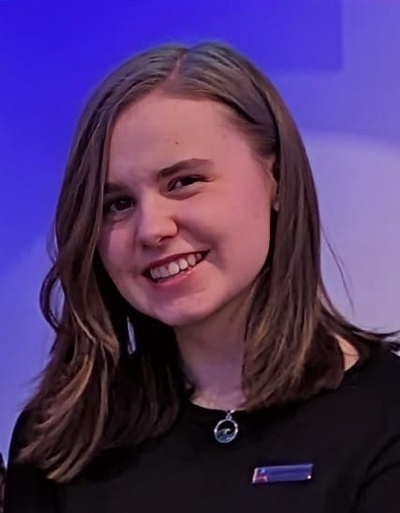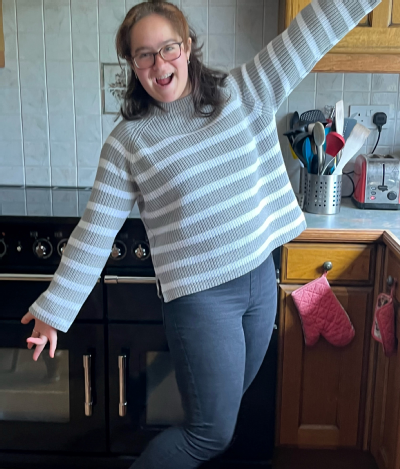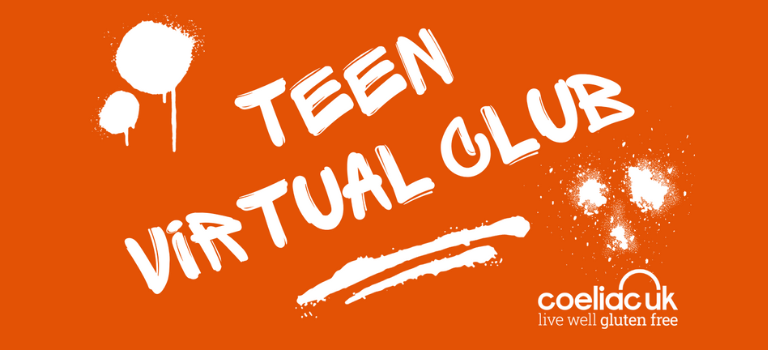Teen Virtual Club
Our Teen Virtual Club is exclusively for
young members of Coeliac UK aged 12-15 years
We meet over Zoom at least four times a year and everyone is welcome, whether you have only just been diagnosed or you were diagnosed when you were much younger.
Our Club provides you with a relaxed safe space to chat with other young people living with coeliac disease and to share your experiences. The club is hosted by our fantastic team of young volunteers (16-18 year olds who share their coeliac disease diagnosis).
Our clubs vary, sometimes we talk about a particular theme like eating out or travel or how we explain coeliac disease to others. Or we just hang out, share our stories, recipes, tips and ideas. Plus, there are occasionally fantastic cook alongs too, including ones with our fabulous ambassador Becky Excell.
To make sure you get your invitation to our next Club please ask your parent/carer to login into their online membership account and make sure everything is up to date.*
We can’t wait to see you at the next event!
*Teen Virtual Clubs are only available to Coeliac UK members. The child/dependant will need to be linked to a current Parent/Carer or Household lead membership account. Clubs are free and supported by a DBS checked Coeliac UK staff member.
Meet our hosts

Alex
How has coeliac disease affected you? When were you first diagnosed?
"I was first diagnosed about 18 months ago. Coeliac disease had caused me some nutritional deficiencies up to that point, such as an iron deficiency. It also might have slowed down my growth and could have also been the reason for a few unexplained vomiting sessions."
What would you like to say to any teenagers reading who are newly diagnosed with coeliac disease?
"Although avoiding gluten seems very difficult at this point, you should know that Coeliac UK are here to help, and that gluten free food availability and coeliac disease awareness are only improving over time. Don't feel embarrassed or awkward to ask for gluten free food or to explain why whoever is making the food needs to be really careful. This is a fairly serious medical condition, so speak up and protect your health. I wish you the very best of luck."
 Annabel
Annabel
How has coeliac disease affected you? When were you first diagnosed?
"I was first diagnosed during lockdown which in a way was good because it gave me time to work out the ins and outs of eating gluten free before having to deal with going out, travelling and everything that lockdown stopped us from doing. Coeliac disease has definitely forced me to plan ahead a lot more whether it’s looking at menus in advance or packing food for trips. But on the positive side, it’s given me a fun focus when exploring a new area as I research beforehand about good gluten free spots in the area and look forward to trying them out! It’s made me appreciate amazing food even more!!"
What would you like to say to any teenagers reading who are newly diagnosed with coeliac disease?
"I think don’t be embarrassed to tell people you have coeliac disease. It may not be the coolest thing but it’s definitely cooler than getting ill!"
Why did you want to get involved as a volunteer in the Teen Virtual Club?
"I love having the opportunity to engage with other Coeliac UK people as you get to share a lot of relatable experiences that no one else really fully understands. I also think I’ve learnt a lot in the past 4 years since my diagnosis and would love to be able to share that with other young people so maybe their diagnosis journey can be a bit easier."
 Eve
Eve
How has coeliac disease affected you? When were you first diagnosed?
"I was first diagnosed two and a half years ago, and it was a big adjustment to make. Coeliac disease has made me be more creative and responsible when it comes to food, as most things now need to be homemade. My cooking skills have definitely come a long way! It was very confusing at first, but things have gotten a lot easier with time."
What would you like to say to any teenagers reading who are newly diagnosed with coeliac disease?
"I know that first getting diagnosed can be scary, confusing and overwhelming. There’s a lot to keep track of, especially when you’re just learning to be independent for the first time, it adds a whole new layer to simple things like going out with friends, but life still goes on, and you’ll find what works best for you! Everyone adapts in their own time, and there are a lot of options out there now. There’s also a huge community of all of us who are going through the same thing, so there’s always someone who knows how things are. In summary, it’ll all be alright in the end."
Why did you want to get involved as a volunteer in the Teen Virtual Club?
"I wanted to get involved with the Teen Virtual Club because I would have loved something like this when I was first diagnosed, and if mentoring the club can help anyone else feel a little less isolated and overwhelmed, then it’s a wonderful thing to take part in. Sharing advice, anecdotes and information is incredibly important, and I think it helps everyone know that they’re not alone in all of this. I know I’ve certainly felt the benefits of having this community! Plus, the club is just a lot of fun!"
 Lola
Lola
How has coeliac disease affected you? When were you first diagnosed?
"I was diagnosed when I was 2, this means that I have grown up without knowing the difference! "
What would you like to say to any teenagers reading who are newly diagnosed with coeliac disease?
"I would have to say that no matter how scary and difficult you think it is now, it will get so much easier that very shortly you won’t need so much effort going into it."
Why did you want to get involved as a volunteer in the Teen Virtual Club?
"I wanted to volunteer for the coeliac society as I have been a member for as long as I can remember and I want to help teens who might be struggling with their diagnosis with any potential help I can give."
A note for parents and carers
We have a range of information you can provide your child’s school to make sure they understand how to support your child. Click here for more information.
